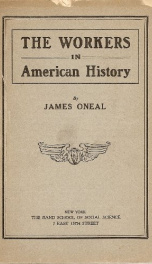the workers in american history

Purchase of this book includes free trial access to www.million-books.com where you can read more than a million books for free. This is an OCR edition with typos. Excerpt from book: Chapter III White Slavery in the Colonies Marx has said that "A great deal of capital, which appears today in the United States without any certificate of birth, was yesterday, in England, the capitalized blood of children."1 The same holds true of men and women of other countries of Europe. By the beginning of the seventeenth century the beggared population of England became a "problem" to the ruling class. The extension of the wool trade gave added stimulus to the eviction of the poor from the land and transforming great estates of fertile soil into sheep pastures. The gulf between the plunderers and their victims widened and the desperate poverty of the latter increased the fear of labor revolts. "Colonization was thought by many to be the only means of obtaining permanent relief from the pressing political and economic dangers of pauperism."2 But even this pauperism was not permitted to be an unprofitable by-product of land thefts. The American colonies were regarded as a convenient dumping ground for these unfortunates, so that between the years 1661 and 1668 various proposals were made to the king and council to constitute an office for transporting to the plantations all vagrants, rogues and idle persons that could give no account of themselves, felons who had the benefit of clergy, and such as were convicted of petty larcenysuch persons to be transported to the nearest seaport and to serve four years if over twenty years of age, and seven years if under twenty. It was poor wretches like these in England, Germany and other countries who were seized upon to provide white slave labor for the colonies. This cheap, servile labor was essential to the societyplanted by the corporations in the New World. Transported laborers could not be held to their tasks of producing ... --This text refers to an alternate Paperback edition.
Info about the book
Author:
Series:
Unknown
ISBN:
1171577648
Rating:
1/5 (40)Your rating:
0/5
Languge:
English
Users who have this book
Users who want this book
What readers are saying
What do you think? Write your own comment on this book!
write a commentGenre
if you like the workers in american history try:
Other books by this author
Do you want to exchange books? It’s EASY!
Get registered and find other users who want to give their favourite books to good hands!


